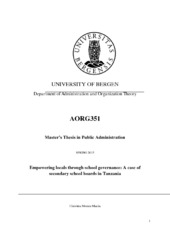Empowering locals through school governance: A case of secondary school boards in Tanzania
Master thesis
Permanent lenke
https://hdl.handle.net/1956/10103Utgivelsesdato
2015-06-01Metadata
Vis full innførselSamlinger
- Department of Government [457]
Sammendrag
This study has been an attempt to address to what extent school boards as one of the user committees in education system are empowered and effective in accomplishing their responsibilities. The study had four specific objectives which were to examine the process involved in selecting board members; to examine the extent to which school board members were informed of their responsibilities; to examine board members access to resources and to asses' degree of autonomy possessed by school boards in making decisions. The study was focused on the two LGA's (Moshi Rural district council and Hai district council) where two schools were chosen one from each LGA, therefore the study was comparative. The two schools were studied in detail to examine if there was any significant difference between community public school and government public school in terms of how their school boards are empowered to accomplish their responsibilities effectively. The study employed qualitative approach where data was collected from in-depth interview, documentary review and direct observation. The sample size was 34 people who were chosen purposeful from different groups composed students, education officials, teachers and school board members. The empowerment theory was used to formulate the analytical framework which was used in analyzing the level of empowerment and effectiveness of the two mentioned cases. Key empowerment indicators which are access to information, access to resources, board selection procedure and autonomy were analyzed. From the findings, it was realized that school A which was government school was doing better compared to school B which is a community school due to the fact that most of its board members were more educated that those from school B. Not only that but school A was receiving full support from government grants something which contributed them to have better resources than school B which was partly depending on the community contribution which affected their financial resource base. Generally, the study concluded that although school boards from the studied cases are trying to accomplish their responsibilities but empowerment and effectiveness is still a promise far from reality due to the fact that school boards still suffer from lack of important information that helps them to participate in making school decisions like planning. The schools also lack enough educated human resources and proper mechanism to train school boards so this made them to have less potentiality in making school decisions. Also lack of enough access to financial resources as a result of poverty and low government budget affect their level of empowerment. Most of all the fact that, school boards are still considered as the voluntary advisory councils so this affects their level of autonomy in influencing school decision. Therefore this portrays that school boards are symbolic representatives who are there to fulfill or verify what is planned by other actors such as teachers, LGA's or central government.
Utgiver
The University of BergenBeslektede innførsler
Viser innførsler beslektet ved tittel, forfatter og emneord.
-
School withdrawal in Norwegian upper secondary school: the role of students' affective bond to school
Hole, Torstein Nielsen (Master thesis, 2013-05-15)The aim of this project has been to gain insight into subjective student experiences in upper secondary school. The background of the project has been an increased concern for school completion in the Norwegian government's ... -
Empowerment of School Committees and Parents in Tanzania: Delineating Existence of Opportunity, Its Use and Impact on School Decisions
Masue, Orest Sebastian (Doctoral thesis, 2014-12-05)Since the end of the twentieth century, public administration systems in developing countries have undergone significant transformation. This comes as a result of the global shift from centralized to decentralized political, ... -
Program and School Characteristics Related to Teacher Participation in School Health Promotion
Viig, Nina Grieg; Tjomsland, Hege Eikeland; Wold, Bente (Peer reviewed; Journal article, 2010)The aim of this study was to investigate conditions related to teacher participation in the planning and implementation of the Norwegian part of the European Network of Health Promoting Schools. One hundred and four teachers ...
